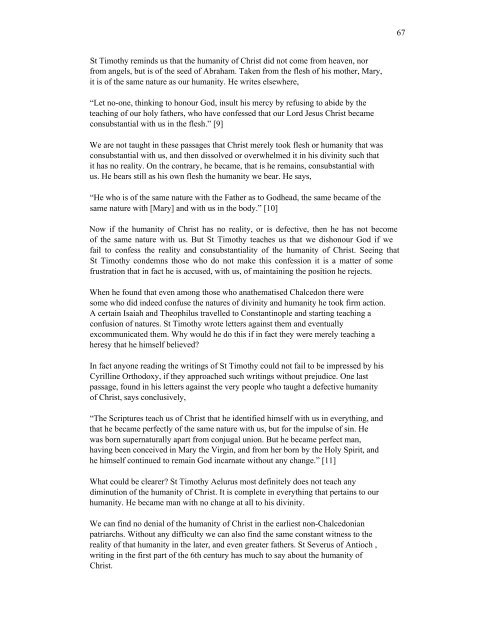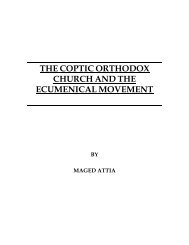Coptic interpretations of the Fourth Ecumenical Council - Saint Mina ...
Coptic interpretations of the Fourth Ecumenical Council - Saint Mina ...
Coptic interpretations of the Fourth Ecumenical Council - Saint Mina ...
Create successful ePaper yourself
Turn your PDF publications into a flip-book with our unique Google optimized e-Paper software.
St Timothy reminds us that <strong>the</strong> humanity <strong>of</strong> Christ did not come from heaven, nor<br />
from angels, but is <strong>of</strong> <strong>the</strong> seed <strong>of</strong> Abraham. Taken from <strong>the</strong> flesh <strong>of</strong> his mo<strong>the</strong>r, Mary,<br />
it is <strong>of</strong> <strong>the</strong> same nature as our humanity. He writes elsewhere,<br />
“Let no-one, thinking to honour God, insult his mercy by refusing to abide by <strong>the</strong><br />
teaching <strong>of</strong> our holy fa<strong>the</strong>rs, who have confessed that our Lord Jesus Christ became<br />
consubstantial with us in <strong>the</strong> flesh.” [9]<br />
We are not taught in <strong>the</strong>se passages that Christ merely took flesh or humanity that was<br />
consubstantial with us, and <strong>the</strong>n dissolved or overwhelmed it in his divinity such that<br />
it has no reality. On <strong>the</strong> contrary, he became, that is he remains, consubstantial with<br />
us. He bears still as his own flesh <strong>the</strong> humanity we bear. He says,<br />
“He who is <strong>of</strong> <strong>the</strong> same nature with <strong>the</strong> Fa<strong>the</strong>r as to Godhead, <strong>the</strong> same became <strong>of</strong> <strong>the</strong><br />
same nature with [Mary] and with us in <strong>the</strong> body.” [10]<br />
Now if <strong>the</strong> humanity <strong>of</strong> Christ has no reality, or is defective, <strong>the</strong>n he has not become<br />
<strong>of</strong> <strong>the</strong> same nature with us. But St Timothy teaches us that we dishonour God if we<br />
fail to confess <strong>the</strong> reality and consubstantiality <strong>of</strong> <strong>the</strong> humanity <strong>of</strong> Christ. Seeing that<br />
St Timothy condemns those who do not make this confession it is a matter <strong>of</strong> some<br />
frustration that in fact he is accused, with us, <strong>of</strong> maintaining <strong>the</strong> position he rejects.<br />
When he found that even among those who ana<strong>the</strong>matised Chalcedon <strong>the</strong>re were<br />
some who did indeed confuse <strong>the</strong> natures <strong>of</strong> divinity and humanity he took firm action.<br />
A certain Isaiah and Theophilus travelled to Constantinople and starting teaching a<br />
confusion <strong>of</strong> natures. St Timothy wrote letters against <strong>the</strong>m and eventually<br />
excommunicated <strong>the</strong>m. Why would he do this if in fact <strong>the</strong>y were merely teaching a<br />
heresy that he himself believed?<br />
In fact anyone reading <strong>the</strong> writings <strong>of</strong> St Timothy could not fail to be impressed by his<br />
Cyrilline Orthodoxy, if <strong>the</strong>y approached such writings without prejudice. One last<br />
passage, found in his letters against <strong>the</strong> very people who taught a defective humanity<br />
<strong>of</strong> Christ, says conclusively,<br />
“The Scriptures teach us <strong>of</strong> Christ that he identified himself with us in everything, and<br />
that he became perfectly <strong>of</strong> <strong>the</strong> same nature with us, but for <strong>the</strong> impulse <strong>of</strong> sin. He<br />
was born supernaturally apart from conjugal union. But he became perfect man,<br />
having been conceived in Mary <strong>the</strong> Virgin, and from her born by <strong>the</strong> Holy Spirit, and<br />
he himself continued to remain God incarnate without any change.” [11]<br />
What could be clearer? St Timothy Aelurus most definitely does not teach any<br />
diminution <strong>of</strong> <strong>the</strong> humanity <strong>of</strong> Christ. It is complete in everything that pertains to our<br />
humanity. He became man with no change at all to his divinity.<br />
We can find no denial <strong>of</strong> <strong>the</strong> humanity <strong>of</strong> Christ in <strong>the</strong> earliest non-Chalcedonian<br />
patriarchs. Without any difficulty we can also find <strong>the</strong> same constant witness to <strong>the</strong><br />
reality <strong>of</strong> that humanity in <strong>the</strong> later, and even greater fa<strong>the</strong>rs. St Severus <strong>of</strong> Antioch ,<br />
writing in <strong>the</strong> first part <strong>of</strong> <strong>the</strong> 6th century has much to say about <strong>the</strong> humanity <strong>of</strong><br />
Christ.<br />
67








